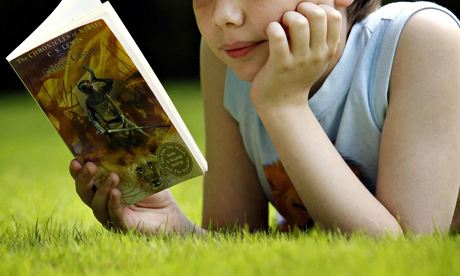Frank Cottrell Boyce: schools are destroying the power of stories | Books | theguardian.com
Frank Cottrell Boyce: excessive analysis of books puts kids off reading
Writer to use David Fickling lecture to argue that some teaching methods promoting literacy are polluting the reading experience

The pleasure children get from reading is being put at risk by the teaching methods being used to encourage literacy, the writer Frank Cottrell Boyce will warn on Friday.
The writer, who won the 2004 Carnegie medal for his first children’s book, Millions, is giving the annual David Fickling lecture in Oxford, in which he will passionately defend reading for the sake of reading.
Cottrell Boyce will argue that children are too often asked to analyse the text of a book or respond to a story with their own story, polluting the whole reading experience.
“I visit many schools,” he will say in the lecture. “I see amazing, creative work being done – especially in primary schools. But I have a nagging fear that in encouraging literacy we are killing the pleasure of reading.”
Cottrell Boyce recounts one experience when he read aloud in a school. “There’s a humbling, Homeric magic in the sight of a crowd of children sitting down waiting to listen to your story.”
After he read his story, he recalls, a young, newly qualified teacher addressed the children. “She said: ‘We’re going to use our listening skills to try and spot his wow words and his connectives so that we can appreciate how he builds the story.’
“Imagine going on a date with her. ‘We’re going to have some proteins. Some carbs – not too many – and conversation. If you make me laugh, that’s a physical reaction so it puts you on the erotic spectrum and you might get lucky.’”
Cottrell Boyce will say that he gets letters from year six children all the time asking the same questions of him.
“Time and time again I come across teachers reading a story and then asking immediately for some kind of feedback. A piece of ‘creative writing’ ‘inspired by’ the story. Some opinions about character and wow words. Something to show the parents or the school inspectors.
“It pollutes the reading experience by bringing something transactional in to play. It destroys pleasure.”
Pleasure in reading, Cottrell Boyce will say, is deeply important. “Pleasure is a profound and potent form of attention, a kind of slow thinking.”
He continues: “When I offer you a story I don’t want you to come back to me with a description of how I did it. I don’t think of my reader as a trainee writer. I’m hoping that it stays in your mind and comes out in different ways I could never have predicted – as an engineering idea, as a cake, as a hug that you give your dad.”
Cottrell Boyce, who wrote the script for the London 2012 opening ceremony, encourages people to read aloud to others. “We think of reading as a solitary activity but some of my most important reading experiences were very much shared.”
Encouraging children to read for pleasure is a key aim with 2012 figures from the National Literacy Trust revealing that 14% of children and young people in lower income homes rarely or never read for pleasure .
Last year Neil Gaiman argued that children should be allowed to read whatever they want and warned that well-meaning adults – who might argue that Enid Blyton or RL Stine or comics were not worth reading – could even destroy a child’s love of reading for ever.
Frank Cottrell Boyce: excessive analysis of books puts kids off reading | Education | The Guardian
.
.
.
No comments:
Post a Comment